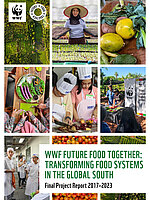Sustainable eating - even outside the home

The Sustainable Diner Summit 2020 in the Philippines brought together the key stakeholders in the food service industry.
The tourism industry of the Philippines is growing rapidly and is important for the country. Tourism is associated with high energy consumption and thus with high greenhouse gas emissions. An important part of the tourism value chain is the food service sector with restaurants as most important service providers. However, it is not only tourists who take advantage of the possibility to have a meal in a restaurant. On average, the population uses twelve percent of their income to eat out.
One of the most important challenges arising from growing food services is the need to prevent that food is wasted. After all, wasting food also means wasting the energy used to produce, process and transport the food. The IKI project “Establish Sustainable Consumption and Production - a South-South Transfer” wants to contribute to more sustainability in the hospitality and tourism sector in the Philippines under the title “The sustainable diner”. Consumers and food service providers show little awareness of the problem and have only limited knowledge of sustainable consumption and production patterns. This is where the project comes in, offering education and information as well as training and public communication on the subject.
The Sustainable Diner Summit 2020 in the Philippines brought together the key stakeholders in the food service industry
On March 3, 2020, the World Wide Fund for Nature (WWF) Philippines brought together project partners to The Sustainable Diner Summit with the theme, “Beyond Research: Sustainability in the Food Service Sector” held at Seda Vertis North, Quezon City, Philippines. The event aimed to recognize the advocacy partners and to report back the results of action research to the project stakeholders. The participants were from national agencies and local government units, the food service industry, other sectors with the hospitality industry, the academe, civil society, and the media.
After Ms. Melody Melo-Rijk, WWF’s Project Manager for Sustainable Consumption and Production (SCP) in the Philippines, presented the Sustainable Diner project’s highlights and various project stakeholders shared messages to discuss the established partnerships in building SCP strategies. Among them was the German ambassador Anke Reiffenstuel, Emmanuel De Guzman, Secretary of the Climate Change Commission, Hon. Maria Rica Bueno, Assistant Secretary of the Department of Tourism Maria Josefina Belmonte, Mayor of Quezon City.
 The Sustainable Diner project also reported research studies they have conducted in collaboration with its consultants. The studies were developed through intensive research and analysis, with inputs based on experiences encountered since the project’s inception in 2017. The action research studies focused on the following: Food Waste Management Case Study, Feasibility Study on Food Donation Program, Cost-Benefit Analysis of Sustainable Business Approaches, Food Service Life Cycle Assessment, Eco-labelling Criteria for Food Service and Environmental Teaching Manuals for Primary and Secondary School Teachers.
The Sustainable Diner project also reported research studies they have conducted in collaboration with its consultants. The studies were developed through intensive research and analysis, with inputs based on experiences encountered since the project’s inception in 2017. The action research studies focused on the following: Food Waste Management Case Study, Feasibility Study on Food Donation Program, Cost-Benefit Analysis of Sustainable Business Approaches, Food Service Life Cycle Assessment, Eco-labelling Criteria for Food Service and Environmental Teaching Manuals for Primary and Secondary School Teachers.
Overall, the summit became a learning and sharing event for its project stakeholders. This includes scaling up the implementation of long-term SCP policies and strategies supported by scientific data and evidence-based approaches. The summit aims to contribute to the Sustainable Development Goals, particularly Goal 12, which focuses on SCP in the Philippines.
The link has been copied to the clipboard
Contact
IKI Office
Zukunft – Umwelt – Gesellschaft (ZUG) gGmbH
Stresemannstraße 69-71
10963 Berlin








![[Translate to English:] Cover Beyond research: Nachhaltigkeit im Food-Service-Sektor](/legacy/Bilder/2020/20200707_Cover_Beyond_research.jpg)


![[Translate to English:]](/legacy/_processed_/f/5/csm_20200911_organic_agriculture_in_Nan_province_e0f204d31c.jpg)

